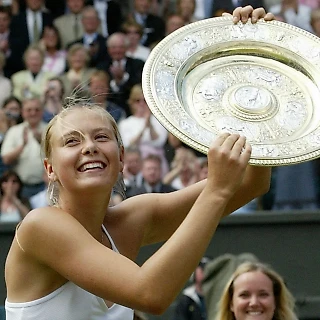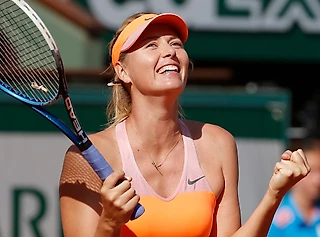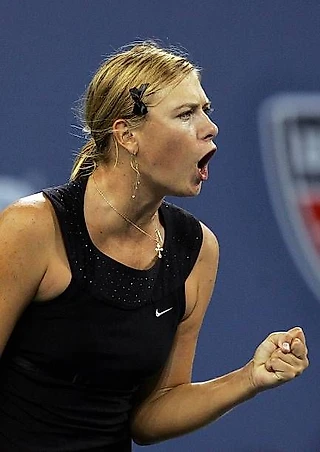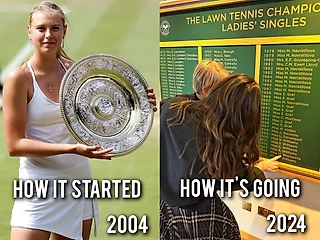Dealmaker for the Shotmakers
Выставил хорошую статью Питера Латтмана в которой он рассказывает об агенте Марии Макс Айзенбад
By PETER LATTMAN
Published: August 26, 2012
When Maria Sharapova decided that she wanted to stay at a new hotel for this year’s United States Open, her agent, Max Eisenbud, embarked on a reconnaissance mission. He met with management and interviewed security officials. He toured suites and tested room service. He took a taxi from the lobby entrance to the Midtown Tunnel, mapping out the fastest route to the tennis center in Queens.
“I used to delegate this sort of thing, but it always got screwed up,” Eisenbud said. “Maybe it’s grunt work, but where Maria stays is important. She’s coming here for three weeks to try and win a Grand Slam.”
When it comes to his prized client, no task is too menial for Eisenbud, who has represented Sharapova since she was 12. Today, at 25, she is the highest-paid female athlete in the world, earning about $28 million over the past year, according to Forbes magazine. Another Eisenbud client, the breakout Chinese star Li Na, ranks No. 2 on the Forbes list, having earned about $18 million.
“You could fairly say that Max and Maria have the most successful agent-player relationship in the history of the game,” said Andrew Walker, the chief marketing officer for the WTA. “And it’s been amazing to watch him replicate that success with Li Na.”
Eisenbud, a genial 40-year-old former college tennis player, prefers to stay behind the scenes. He agreed to be interviewed for this article only because he wanted to draw attention to Sharapova’s new business venture, a candy company named Sugarpova. Eisenbud serves as its chief executive.
“He gave himself that title,” teased Sharapova, who was seated next to Eisenbud backstage at “CBS This Morning” last week. She was appearing on the show to promote the colorful line of lip-shaped gummies and tennis-ball-shaped gum.
“But I’m the only C.E.O. in America not getting paid,” Eisenbud volleyed back.
While drawing no salary from the confectionary start-up, Eisenbud and his employer, the Cleveland-based sports and entertainment giant IMG, have earned millions of dollars meticulously managing Sharapova’s career.
Spend time with Eisenbud and Sharapova, and it is apparent their relationship runs deeper than a business partnership. Their dynamic most resembles that of an affable uncle and a spunky niece. She relentlessly needles him about his receding hairline and expanding waist. He urges her to turn in early that night and skip dinner at a swanky restaurant. (She didn’t.)
Asked how they have stayed together so long in a sport where agent-player alliances are fickle, Sharapova said, “We don’t see each other that often.”
Eisenbud agreed, saying: “I’m better in small doses. My wife feels the same way.”
But get past the shtick, and they display a genuine affection for each other.
“Max is half family, half agent,” Sharapova said. “He has been with me and believed in me from the beginning. I can be guarded around new people, but with Max, because of our history, there is a special level of trust.”
Around the Eisenbud home in Miami, where he lives with his wife, Danielle, and two young sons, Sharapova is known as Aunt Maria.
“Everything I have I owe to her, from the house I live in to the toys I buy my kids,” Eisenbud said.
Growing up in Short Hills, N.J., Eisenbud dreamed of competing at the United States Open. A top-ranked junior, Eisenbud won a full tennis scholarship to Purdue, where he played four years on a middling team.
He also spent four years as social chairman of his fraternity, Pi Kappa Alpha, becoming a minor campus celebrity for hosting blowout parties and promoting concerts. After college, he spent several years managing Push Down and Turn, an Indiana band he thought could be the next Rolling Stones. It was not even the next Gin Blossoms.
Approaching 30 and starting to worry about his future, Eisenbud received a call from Justin Gimelstob, a childhood friend who was then a rising star on the men’s tour. Gimelstob needed help organizing a charity tennis event featuring John McEnroe at their hometown club. Eisenbud handled the assignment with aplomb, leading Gimelstob, an IMG client, to suggest that he become a tennis agent. He had never considered the career because he mistakenly thought agents had to be lawyers.
“Law school wasn’t an option for me,” Eisenbud said. “I could barely get through Purdue.”
In 1999, IMG offered Eisenbud a job paying $27,500 a year. They sent him to the Nick Bollettieri Tennis Academy in Bradenton, Fla., an IMG-owned training center for young talent. In a newly created post, he served as a buffer between the junior players and their agents, who were based in Cleveland and busy managing the likes of Pete Sampras and Monica Seles. Eisenbud did everything, including overseeing the youngsters’ racket sponsorships and coddling their overbearing parents.
On his first day in Florida, he was handed a list of the players and their practice times. As Eisenbud roamed the courts, he was stopped in his tracks by a tall, lithe 12-year-old smacking ground strokes with a supernatural intensity.
“You ever see the videos of Tiger Woods hitting the golf ball when he was 6?” Eisenbud said. “It was like that.”
Eisenbud had a hunch that the 12-year-old, Sharapova, who had come from Russia four years earlier, would be his meal ticket. He ingratiated himself to her and her parents, helping them settle sticky visa issues and deal with the Russian tennis federation. Sharapova’s father asked that Maria work with Eisenbud full time, and within 18 months, he had moved to Cleveland and was representing her exclusively.
Though Sharapova started turning heads at 13 with strong performances on the international junior circuit, Eisenbud resisted smaller sponsorship deals. Instead, confident of bigger offers to come, he primed the IMG sales force — a group that works with the corporate clients — by sending continual updates on her progress.
“Don’t sell her, just keep an eye on her,” Eisenbud instructed.
In 2004, when Sharapova won Wimbledon at 17, companies were tripping over one another to sign her.
“That’s when I saw the amazing machine that Mark McCormack built swing into action,” said Eisenbud, referring to the pioneering sports lawyer who started IMG. “Suddenly I went from being an idiot to the smartest agent in the world.”
By the end of 2005, Sharapova had signed seven-figure contracts with Motorola, Canon, TAG Heuer, Colgate and Land Rover. An eight-year deal with Nike signed in 2010 could exceed $70 million, a figure that includes royalties from her best-selling Maria Sharapova signature ballet flat from the Nike-owned Cole Haan. Forbes has named her the world’s top-earning female athlete eight years running. Harvard Business School teaches a case study on the success of her brand.
Right behind Sharapova in earnings is Li, the No. 1-ranked woman in China. IMG had long yearned to sign Chinese players, given the opportunity for Western companies to reach the country’s growing middle class. The Chinese government had prohibited its athletes from working with agents but loosened its reins after the 2008 Beijing Olympics.
When Eisenbud signed Li in 2009, she was ranked in the top 25. Sponsorship opportunities abounded, including several fast-growing Chinese apparel companies that wanted to outfit her. Sensing an opportunity, Eisenbud struck a hard bargain with Nike. He negotiated a deal that allowed Li to wear patches with other corporate logos on her clothes. Every other Nike tennis player — Roger Federer and Sharapova included — is barred from doing so.
Last year, Li won the French Open, the first Asian-born player, man or woman, to win a Grand Slam singles title. Just as he did after Sharapova’s Wimbledon victory, Eisenbud seized the moment. Within weeks, he struck seven large corporate deals worth about $48 million over three years. Mercedes-Benz and Taikang Life Insurance are each paying Li $2.5 million a year to advertise on her sleeves.
“One of the toughest decisions an agent has to make is when to cash in,” said Darren Rovell, ESPN’s sports business reporter, “and Max’s timing on both Sharapova and Li Na has been exactly right.”
Eisenbud dismisses the notion that he is some kind of commercial killer whose masterly negotiating secures more money for his clients than they ever dreamed possible. He likes to compare himself to Phil Jackson, the coach who won N.B.A. titles with Michael Jordan and Kobe Bryant on his teams.
“Phil Jackson is a good coach, and I’m a good agent, but I wouldn’t be sitting here right now if my clients weren’t Maria Sharapova and Li Na,” Eisenbud said. “My main job is to not screw this up.”










:) :) :)